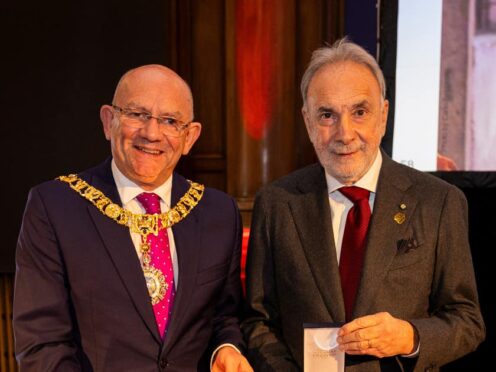
An ethical Italian research institute has won a prestigious prize from the organisers of the Edinburgh International Science Festival.
The Edinburgh Medal was given to the Mario Negri Institute, a research arm which does not patent its discoveries, at a ceremony in the Scottish capital on Tuesday.
Founded in 1961 following a bequest from its eponymous philanthropist, the institute has developed a drug for those who have previously suffered a heart attack which is believed to have saved millions on lives, as well as introducing trabectedin to the market in 2007, which improves outcomes for sufferers of the bone cancer sarcoma.
Presented the medal by Edinburgh’s Lord Provost Robert Aldridge, institute director Giuseppe Remuzzi said it was “well deserved”, due to the work of researchers since its inception.
“The Edinburgh Medal also recognises the contributions of all the students we have trained, particularly the impressive number of over 900 international students who have trained at the Mario Negri,” he added.
Former students at the institute have gone on to advise health ministries across the world and advise universities, Mr Remuzzi said.
🏅 Last night, we were pleased to award The Edinburgh Medal to the Mario Negri Institute for Pharmacological Research 🏅 pic.twitter.com/EnV4gfybc9
— Edinburgh Science (@EdSciFest) April 3, 2024
Dr Simon Gage, director and chief executive of Edinburgh Science, paid tribute to the institute, saying: “The way most medicines and many treatments are devised and prescribed is too often driven by the forces of profit and protectionism.
“This despite most of the basic research being funded by the taxpayer. Over-prescription, high prices preventing ubiquitous access, a lack of interest in widespread diseases perceived to be unprofitable and a reluctance to share trial results are some of the symptoms of the current set-up.
“All get in the way of optimising the health of the global population.
“The Mario Negri Research Institute sees the world differently, and it is its open access approach to research in health that we applaud and feel inspired by.
“The Edinburgh Medal recognises pioneers from the world of science who act to better society. This year’s award to a world-class research institute that shows us a different approach to improving global health could not be more fitting.
“It provokes us to ask why the UK doesn’t have its own institute of this type and to even go further to call for one to be founded.”

Enjoy the convenience of having The Sunday Post delivered as a digital ePaper straight to your smartphone, tablet or computer.
Subscribe for only £5.49 a month and enjoy all the benefits of the printed paper as a digital replica.
Subscribe